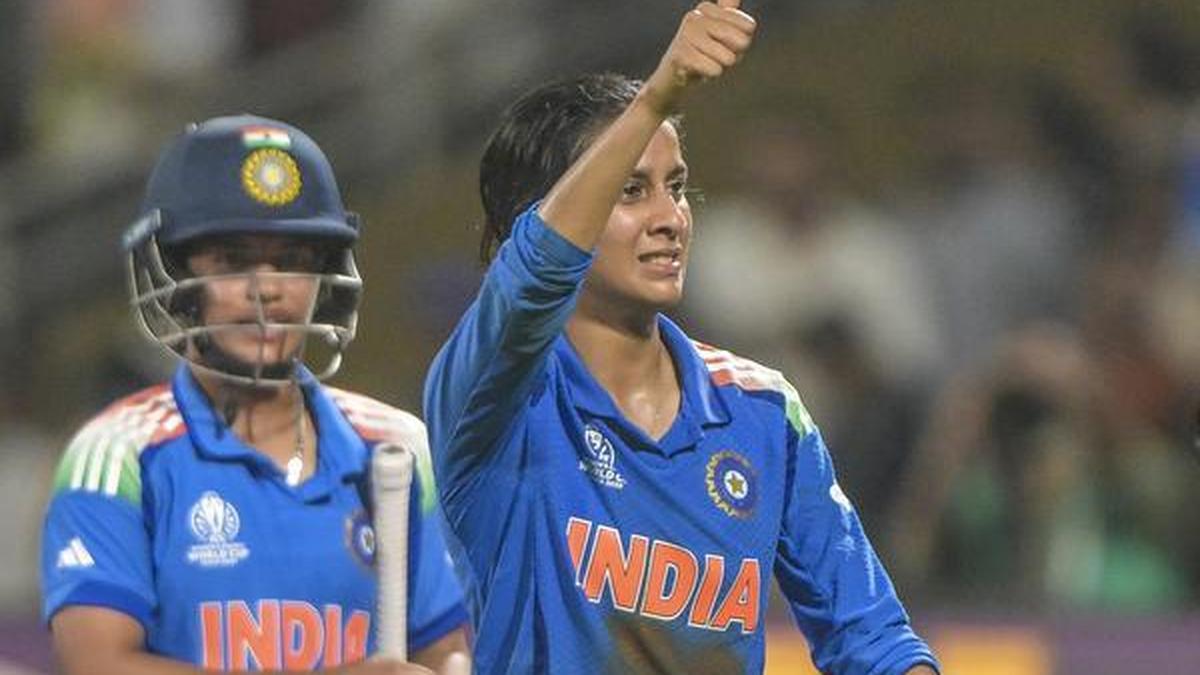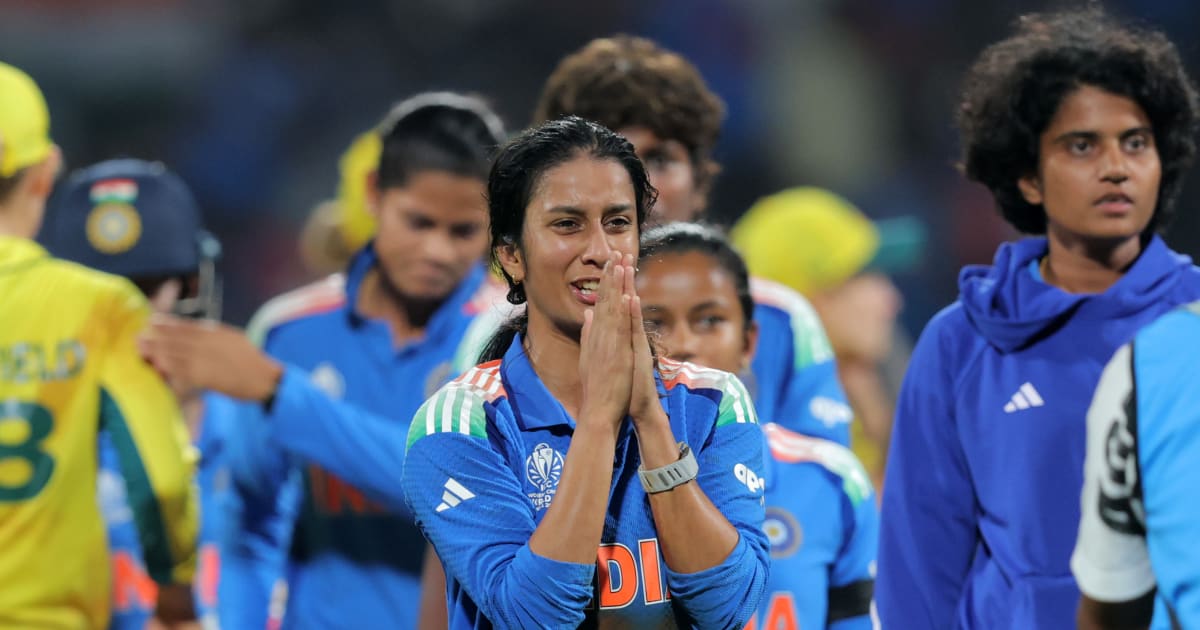Women’s ODI World Cup | I didn’t play for my hundred - I played to see India win: Jemimah Rodrigues

It was a night when India turned the unimaginable into reality. Chasing 339 against the all-conquering Australia in the Women’s ODI World Cup semifinal at DY Patil Stadium, India pulled off the biggest successful chase in the format’s history. And at the heart of it all stood Jemimah Rodrigues – calm, composed and courageous – her unbeaten hundred guiding India into Sunday’s (November 2, 2025) final against South Africa.Also Read | Women's Cricket World Cup, IND vs AUS: Players wear black armbands in tribute to AustinMoments after her match-winning knock, Jemimah opened up about her sudden batting promotion, the mental and emotional battles she has fought over the past month, and the faith that kept her steady through it all.With a rejigged combination, Jemimah was slated to bat at No. 5, behind captain Harmanpreet Kaur. But the team management changed the plans, and by the time Jemimah stepped out of a shower in the dressing room, all she got before walking out to join Smriti Mandhana in the middle was five minutes.“So, I just gave myself some time,” she said with a smile. “I was taking a shower, I took my ice bath first, and then I asked, ‘Is it the same batting order?’ They said yes. Then they sent a message again saying, ‘You are going to go now.’ I said okay, but I was in the shower at that time. I just freshened up, ate something because I hadn’t eaten, and once I walked in there, I thought — how would I play for a Mumbai team when I leave Mumbai? What would I do there?”The promotion wasn’t just a tactical change — it was a test of adaptability. But Jemimah’s preparation and clarity of thought helped her adjust instantly. “I knew I needed to be there, build a partnership with Smriti or Harman or whoever comes in. I knew how important this match was, and I wanted to be there to finish it off. So I just kept telling myself — stand here, just stand here, amazing things can happen. Give God a chance, just stand here, you never know what can happen at the end of the match.”As the innings unfolded, she refused to get carried away by milestones. “When I reached my 50, when I reached my 100, I didn’t celebrate. I looked at our hotel right here (in the stadium premises) and thought — tomorrow morning, what would make me happier? A 50? A 100? No. It would be India winning. I wanted to wake up with that feeling, sleep with that smile — that we are in the final. That kept me motivated.”Even before India’s innings began, Jemimah sensed that the target was within reach, with India pulling things back in the last 10 overs of Australia’s essay.“I felt with the way Australia started, they were 30 runs short,” she said. “With the start they got, I knew they could have pushed on, but they didn’t. And DY Patil is such a pitch — any score is chasable. I just knew that my job was to be there. Runs will come if I am there.”Her partnership with captain Harmanpreet Kaur became the spine of India’s chase. Together, they added 167 runs, blending power and precision, audacity and restraint.“I have been part of chases against Australia before,” Jemimah recalled. “Three times we were going well — we brought it to run-a-ball situations and still lost from there. Those moments taught me a lot. I just wanted to be there this time to finish it off.”The learnings, she said, came full circle. “The previous day, we had a group discussion — what can we do better in this World Cup? I said, ‘I want to be there till the end and finish the game.’ Whether we are batting first or chasing, if I’m there, I know I can create partnerships and find gaps. And today, that just felt like a setup from God. Everything that happened in the last month — it felt like preparation for this moment.”Just when it looked like both set batters would take India home, Harmanpreet fell for 80, caught at deep square leg. And India has had famous – rather infamous – collapses in key matches followingHarmanpreet’s dismissal. “I remember telling Harry di (Harmanpreet) that we both have to finish it,” Jemimah said. “We can’t leave it for the end, just because we are set. We knew we could take it through.”Her partner’s dismissal, however, triggered a shift in Jemimah’s mindset. “When Harry di got out, I think it was a blessing in disguise. I was losing focus because of tiredness, and when she got out, it added more responsibility — that I need to be here, that she is out, so I’ll score for her. That again put me in the right zone. From there, I started playing sensibly again.” She revealed how exhaustion nearly clouded her judgment during the latter part of the chase. “I lost a lot of energy and felt really tired. It was a tricky phase — should I go now or take it deep? That was a big learning — to stay there. Towards the end, I was praying, talking to myself, and talking to God. Because I feel when I can’t carry myself, He carries me.”As composed as she looked on the field, Jemimah admitted that the past month had tested her mentally more than any innings ever could. “I’ll be very vulnerable here because I know someone watching might be going through the same thing,” she said. “I was going through a lot of anxiety at the start of the tournament. Before a few games, I used to call my mom and just cry — cry the entire time. Because when you go through anxiety, you feel numb. You don’t know what to do.”Her voice wavered as she spoke about the support system that carried her through. “My mom, my dad — they supported me so much. There was Arundhati (Reddy) — I think almost every day I cried in front of her. I used to joke, ‘Don’t come in front of me, I’ll start crying!’ But she checked on me every single day. Smriti was there too — she just stood with me in the nets, didn’t say much, but her presence meant a lot. Radha (Yadav) has always taken care of me. I’m so blessed to have friends I can call family. It’s okay to ask for help.”She also spoke about how faith kept her grounded through those moments of doubt. “I’m grateful to Jesus, because His presence and reading the Bible encouraged me in tough times. The Bible says, ‘Weeping endures for a night, but joy comes in the morning.’ Today joy came — but I’m still weeping,” she said, with tears rolling down her cheeks.This wasn’t the first time Jemimah had fought back from adversity. Being dropped from India’s squad during the previous World Cup had shaken her confidence, and even this tournament started poorly for her.“When I came into this World Cup, having been dropped from the last one, I didn’t want to prove a point,” she said. “I just wanted to make sure India wins. Because it’s easy to get into that mindset of proving yourself — and that mindset never helps me.”She admitted that her World Cup campaign had begun with struggles. “I didn’t start well — first match, out on zero. Next match, got a good start but couldn’t convert. Then another zero. Then a 30. Then dropped. Every time I thought, okay, now it’s going to happen, things just got worse. So this knock is very special because of everything I went through — and to do it in front of my family, my team, my people in Navi Mumbai. It feels like my best innings so far. I’m saving one more for the final.”For Jemimah, India’s semifinal success wasn’t about who the opponent was, but about the approach. “Whichever team had come in the semifinals, our reply would have been the same,” she said firmly. “We don’t want to play the team — we want to play the moment and win that moment. We play the match to win it for India, with the same passion and aggression.”By the end of the night, Jemimah was still processing what she had done. The crowd at DY Patil had witnessed history, but for her, it was more than numbers — it was healing, hope, and homecoming.“I haven’t let it sink in yet,” she admitted softly. “It just feels like everything was set up for this. The last month wasn’t easy, but it prepared me for this. I’m grateful to the people who believed in me when I couldn’t believe in myself. I couldn’t have done this alone.”As India marched into another World Cup final, Jemimah Rodrigues’ words carried the emotion of someone who had fought, fallen, and risen again — and in doing so, became the heartbeat of India’s greatest chase.








